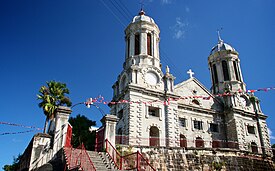St. John's Cathedral (Antigua and Barbuda)
| St. John's Cathedral | |
|---|---|

St. John's Cathedral
St. John the Divine Cathedral Church of the Diocese of North Eastern Caribbean and Aruba |
|
| Basic information | |
| Location | St. John’s, Antigua and Barbuda |
| Geographic coordinates | 17°07′22″N 61°50′31″W / 17.1227°N 61.8419°WCoordinates: 17°07′22″N 61°50′31″W / 17.1227°N 61.8419°W |
| Affiliation | Anglican |
| Province | St. John’s |
| Year consecrated | Originally consecrated in 1683, then rebuilt in 1746 and finally newly built in 1845 |
| Ecclesiastical or organizational status | Good |
| Status | Anglican Church |
| Architectural description | |
| Architectural type | Baroque |
| Architectural style | Baroque |
| Completed | 1848 |
| Specifications | |
| Direction of façade | East |
| Capacity | 2,200 |
| Length | 156 ft |
| Width | 46 ft |
| Spire(s) | Two |
| Spire height | 70 ft |
| Materials | Stone |
St. John's Cathedral also known as the St. John the Divine, the Cathedral Church of the Diocese of North Eastern Caribbean and Aruba, is an Anglican church perched on a hilltop in St. John's, Antigua and Barbuda. It is the seat of the Diocese of the North East Caribbean and Aruba in the Church in the Province of the West Indies.
The present cathedral with its imposing white twin towers was built on a fossilized reef, in 1845, and is now in its third incarnation, as earthquakes in 1683 and in 1745 destroyed the previous structures. The iron gates on the south face of the church are flanked by pillars displaying lead Biblical figures of St John the Divine and St John the Baptist. They were taken by HMS Temple in 1756, from a French ship destined for Martinique.
The present church is the successor cathedral built in the same location where two other churches had existed one after the other. The first St. John’s Anglican Church built here in 1681 was a simple wooden structure, devoid of any decorations. This was severely damaged in the earthquake in 1745. The second, much larger church was built in 1746 of English bricks. The architect of this church was Robert Cullen. It had a short steeple from the western end.
Nearly a century later, the Diocese of Antigua was established in 1842, and St. John's designated its cathedral. Soon thereafter, however, in February 1843, an earthquake caused serious damage to the church. The church was partially restored, and the first Bishop of Antigua, Daniel Davis.
Adjoining the old church, which was damaged, a new cathedral was planned and construction began on October 9, 1845, after Sir Charles Augustus FitzRoy, Governor of Antigua laid the foundation stone. At the end of three years of construction the new cathedral started its first divine service, with the consecration taking place on July 25, 1848. The new church was reportedly able to accommodate a congregation of 2,200.
...
Wikipedia
